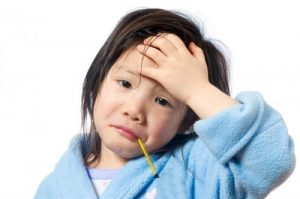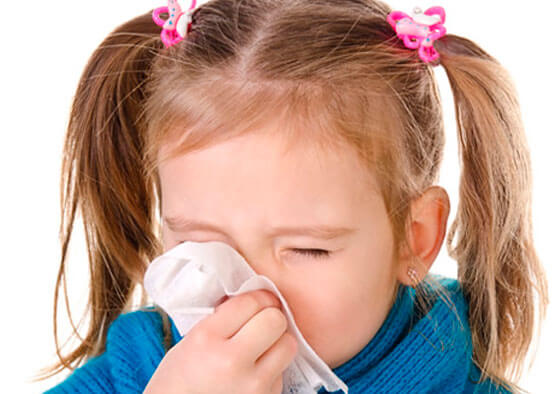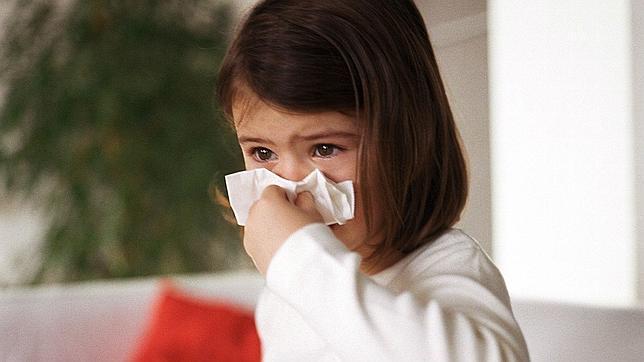12 Ways to Prevent Your Child from Getting a Cold

Colds are an affectation of the respiratory system caused by a virus. They’re very common among children and babies, mainly during the colder periods of the year. On average a child gets a cold between 3 and 8 times a year and the duration of each cold is approximately one week.
Colds are highly contagious between children and babies because they’re caused by contact. In other words, they can be contagious through contact with hands or orally when they cough or sneeze.
The virus enters through the nostrils after the cooling of the mucus membrane when it is cold and from there they it circulates in our organism.
Although most colds are caused by viruses, sometimes a cold can get complicated if bacteria takes advantage of the low defenses of the immune system at the time. This can cause certain complications in babies such as bronquitis and pneumonia. In children, bronquitis is a more frequent complication than pneumonia.
It is important that parents know ways to prevent their child from getting a cold.
How to prevent colds in children?

As we have mentioned above, a cold is one of the most common health affectations that children suffer from. It’s difficult to prevent colds completely. Nevertheless, you can reduce the amount of contagions that your child comes in contact with, which will also reduce the amount of colds they suffer from yearly.
The following recommendations will be useful:
Keep their hands clean
Hands are among the main transmissors of the cold virus by contact. Hence, it is very important to teach children how to wash their hands properly. It is also important to organize a routine for them in order to remind them to wash their hands frequently. All of this allows for hygiene improvement and prevents bacteria.
Cover your mouth
In the same way we teach our children to wash their hands, parents should also teach them to cover their mouths with a handkerchief or their arm. They should remember to do this when they sneeze or cough. It is not wise to cover their mouths with their hands for the reasons previously stated. If they cover their mouths with their hands they should wash them immediately.
Keep their toys clean
Toys should be cleaned regularly because they can also be a mode of transmission for viruses. These objects are always in contact with our children who sometimes have the custom of putting them close to their mouths.
Prevent cigarette smoke and closed spaces
Parents who smoke should never do it close to their children. It is also recommended to make sure other smokers keep away from your children. Keep the spaces they play in well ventilated. Some humidifiers can work wonders.
Colds proliferate in humidity
An environment that is too humid is no adequate for children, neither is an environment that is too dry. You can use a humidifier in order to keep the space with the right amount of humidity which is perfect for the respiratory system.
Hydration
It is very important to give them lots to drink. Good hydration helps to prevent colds. Make it a custom to frequently give your little one water to drink.
Regulate the temperature
It is important to prevent fast changes in temperature. When the body moves quickly from one temperature to another, the probability of catching a cold increase. This usually occurs in children.
Vitamin C against the cold
Incorporate vitamin C in your child’s diet. Introduce foods that contain it, such as: oranges, lemons, kiwis. Some pediatricians also recommend vitamin C supplements. Vitamin C boosts the immune system.
Keep their feet warm
Make sure they keep their feet warm. One recommendation is to put socks on them before they sleep and to keep their feet protected during the day. Prevent their feet from maintaining prolonged contact with the cold floor.

Careful with fireplaces and heating
Experts say that chimneys and radiators can dry out the environment. You can use a humidifier to keep the humidity at the perfect level.
Proper Ventilation
Keeping the house well ventilated is highly recommended. This prevents the concentration and proliferation of viruses in an enclosed space. In the case that you need to use a chimney or heater to keep your house warm, proper ventilation is very important to prevent creating a static and dry environment.
Play outdoors
Even when it is cold outside, children should be allowed some time to play outside in order to get fresh air. Physical activity is very important to keep the body healthy. Playing in fresh air reduces the chances of getting a high concentration of viruses in the body. They should be allowed to play in parks and enjoy nature.
This text is provided for informational purposes only and does not replace consultation with a professional. If in doubt, consult your specialist.
